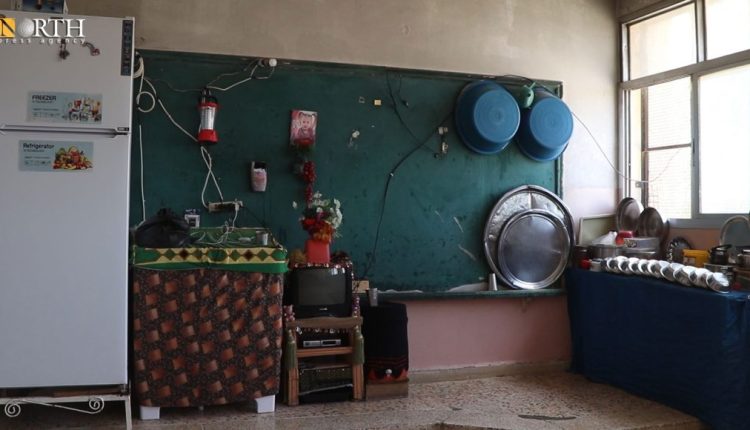
By Samer Yassin
HASAKAH, Syria (North Press) – In the town of Tel Tamr in northeastern Syria,IDPs in makeshift shelters suffer every day from blistering heat of summer, which sometimes reaches to almost 50 degrees. They struggle for survival as they lack clean water, electricity, and cooling systems in the summer.
IDPs start their day by setting up their small solar panels to charge their phones and battery-operated fans, which barely ease scorching heat for few hours.
About 2,000 displaced people live in Tel Tamer and its countryside. They have been residing in 10 schools and shelters since Turkish forces and their affiliated armed opposition factions, aka the Syrian National Army (SNA), occupied the cities of Sere Kaniye (Ras al-Ain) in October 2019.
As summer begins, high temperature and lack of cooling systems, electricity, and potable water exacerbate the situation.
The IDPs in these schools-turned-shelters and makeshift shelter centers suffer from using limited and non-potable water, negatively affecting their health, especially children who suffer from digestive and skin diseases.
Tragic conditions
Sana Hamoud, 30, an IDP in the Musab bin Umair school-turned-shelter in Hasakah, describes the conditions in the shelter as tragic, especially in summer.
“It is very hard to describe our suffering,” she says.
Hamoud was displaced from Sere Kaniye. She currently lives with her mother and two children after losing her husband during the war.
She tells North Press that she is forced to by a block of ice every day for 16,000 Syrian Pounds (SYP, which equals about $1) and water for 25,000 SYP.
The electricity comes at times they do not need, often from 4 AM to 8 AM, she adds.
Hamoud says they repeatedly requested the municipality in Hasakah to dig a well at the school to provide water, but they received no approval.
“Children suffers from fever and diseases like brucellosis and gastric disorders due to non-potable water.”
Sick children
Khloud Abdulaziz, an IDP from the village of Arisha in the countryside of Sere Kaniye, complains about the high temperature and its impact on her children, who suffer from gastric disorders and illnesses.
She says that the temperature rises and they do not have enough cooling devices or even power to run them, in addition to a severe shortage of water.
Abdulaziz stresses that children, especially newborns, suffer from diarrhea and fever due to the lack of cooling devices and the use of non-potable water.
Meanwhile, Hamoud Sheikh Salih, 43, an IDP in the makeshift shelter, points out that children suffer from diarrhea and heat-related diseases due to the consumption of non-potable water and exposure to sunlight.
Salih says, “We soak ourselves in water to cool down a little bit,” adding that children cannot endure the heat, so they take them to clinics multiple times a day.
Disease spread
Hassan al-Hassan, a pediatrician at the Zau Seng Hospital in Hasakah, states that they receive 40 to 50 sick kids every day, due to high temperatures and the consumption of non-potable water.
He adds that more than half of the children suffer from diarrhea, vomiting, and dehydration, along with skin allergies and sunburns due to being exposed to sunlight during peak hours.
The doctor warns that the situation is deteriorating and emphasizes the need to maintain general hygiene and the provision of clean water.
The IDPs in the school-turned-shelters demand solutions and the provision of potable water, electricity, and cooling devices to counter the high temperature and avoid diseases among children and the elderly.
